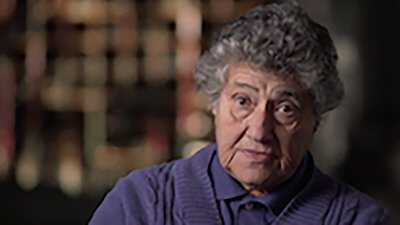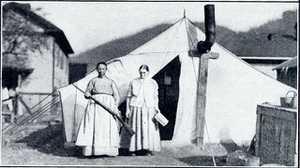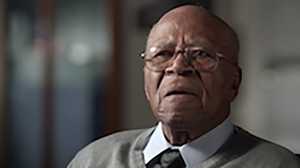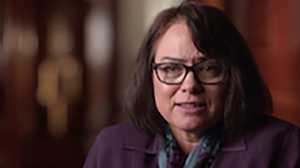Jean Battlo
Jean Battlo is a playwright and local historian who grew up in southern West Virginia. She is the youngest daughter of Fortunato Battaglia, an immigrant from Calabria, Italy, who worked as a coal miner for decades. Ms. Battlo was interviewed on-camera for the 2016 documentary The Mine Wars.

Immigration
The war was coming, and there was fighting in Italy. My dad and his brother, for one thing, they didn’t want to fight in the war. All Europe was a mess, and I think the bottom line is why most people move on to the next frontier -- the excitement, something new.
My father first came here in 1911 with his brother Antonio. His name was Fortunato Battaglia, but they somehow got Tom Battlo out of that, because that was a lot of name. And they spent the first few years in New York and New Jersey, and then the way Dad told it, is there were coal company agents all over, and they were forever trying to bring people down to the coal mines during that period. The coal mines were at the real bang of their boom; it was just starting out. And [the coal company agents] would walk up, for instance, to an Italian and and say, “Lavoro e casa,” in other words, “We can give you a job and a home.” And, they had nothing to lose, you know. They weren’t real sure what they were coming to. They had heard about the coal mines but they didn’t know anything about West Virginia. They came down to the area and began working in the mines, which [my father] loved ’til his dying day.
Falling in love with a photograph
[My dad] was staying with an Italian family called Loggina, translated in English to “Larkins.” And while he was there Mrs. Larkin had a photograph of her niece [Concetta Maria Roschella] in Italy. And fortunately my dad liked that picture very much, and began to write to her, and the understanding was very common during that time. Their story could have been every miner in this microcosm of melting pot here in the coalfields -- he would pay her way over and she would stay with her aunt and they would get acquainted. If she was unhappy, he would pay her way back. And so she came and fortunately for all of us… she liked him and they planned to marry. I think it was only about three months after she had gotten [to West Virginia].
Raising a family in the coalfields
[My parents’] life could not have been harder. Work, everything at those first years was by hand. She washed on a washboard, in a tub, and [worried how to have] enough food until she was able to start gardening, and as the children came, how to take care of them during the Depression. It was a very, very difficult time. The homes were inadequate. It was a roof over their head, but barely. And so there was a lot of difficulty. [But] my dad was the type of man that when he was not finding enough work, and when the Depression was getting started and mines would shut down for a few days, he worked four mines at one time, and he would shift from one to the other. Many of the people at that time, and certainly my mother and dad, did not see that as oppressive.
My dad saw his job as working very hard, getting a good living, being able to plan for a future so that most of his grandchildren are professionals and trying to provide for that future. And he saw the mines as a means to do that. And he was a physical guy. He liked hard work very much, so he enjoyed the work. I think that’s bound in a work ethic that people used to have that, “I’ve got a good life. I love this woman. I love these kids.” I think he thought of himself as blessed. He was an extremely happy man and he saw the mine as providing that, and that part is true. But they were committed to [education]. My mother told him, “We can do without food. We can do without this, that, and the other, but these kids will finish school.”
Strikes, and fighting for economic equality
These kind of fights were going on everywhere, but again, you have to remember how much the coal operators’ associations controlled -- including newspapers -- and so again it was an easy write-off to call this just mountain men fighting it out. And that’s what apparently happened instead of seeing this as part of the continuation of the American Revolution. There was an attempt at equality everywhere, but we had not even begun the battle for economic equality. And that’s what unions were, whether they were in the hills of… Matewan, West Virginia or the streets of Paris, France, or in Moscow. It was the same fight. It was the same aspiration. And it was the same, I would even call it, need for that period of the democracy to become complete and begin to look at how much economic equality can we work toward.







